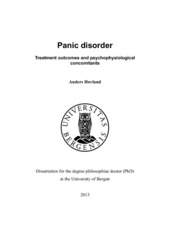| dc.contributor.author | Hovland, Anders | |
| dc.date.accessioned | 2013-12-13T12:20:38Z | |
| dc.date.available | 2013-12-13T12:20:38Z | |
| dc.date.issued | 2013-10-17 | eng |
| dc.identifier.isbn | 978-82-308-2394-1 | eng |
| dc.identifier.uri | https://hdl.handle.net/1956/7604 | |
| dc.description.abstract | Panic disorder (PD) is severe anxiety disorder that follows a chronic course if left untreated. The recurrent panic attacks and persistent worrying of new attacks that are characteristic of PD is highly distressing and can lead to extensive disability. PD is also associated with a malign clinical course, and the physiological changes characteristic of PD, such as altered cardiac regulation is associated with increased risk of somatic illness. We compared physical exercise (PE) in groups to group cognitive behaviour therapy (CBT) as treatment for PD in a randomised clinical trial (RCT). Thirty six patients with PD with or without agoraphobia were recruited for participation in either PE three times per week or CBT once a week for twelve weeks. Participants were assessed twice prior to treatment initiation. They were thereafter assessed immediate post treatment, and at six and twelve months following treatment termination. We found CBT to yield significantly better long-term effects on the primary outcome measures, though PE still yielded large effects on key measures of panic symptoms and severity, also one year following treatment termination. Importantly, rates for clinically significant change were significantly higher for CBT, and further indicated that the majority of subjects in the PE group had not fully recovered from their disorder. We also investigated the relationship between vagally mediated heart rate variability (HRV) and cognitive executive functioning in the same sample of patients, and found that these measures were consistently associated. This extends previous research and provides support for the hypothesised relationship between altered functioning in the prefrontal cortex (PFC) and vagally mediated HRV. We also explored the relationships between these measures and clinical variables, and found both cognitive inhibition and HRV to be related to both severity and duration of the panic disorder. This suggests that cardiac health is related to both cognitive functioning and the clinical state and duration of PD. Finally, we assessed the same participants on a measure of subjectively reported sleep impairment. We investigated the relationships between this measure and both vagally mediated HRV and scores on cognitive inhibition, and found both sleep onset latency (SOL) and disturbances during sleep to be related to these physiological and cognitive measures. Furthermore, these relationships were independent of level of depression, and the results provide support for the psychobiological inhibition model of insomnia and extend previous findings in support of this model. | en_US |
| dc.language.iso | eng | eng |
| dc.publisher | The University of Bergen | eng |
| dc.relation.haspart | Paper I: Hovland, A., Nordhus, I. H., Sjøbø, T., Gjestad, B. A., Birknes, B., Martinsen, E. W., . . Pallesen, S. (in press). Comparing physical exercise in groups to group cognitive behaviour therapy for the treatment of panic disorder in a randomized controlled trial. Behavioural and Cognitive Psychotherapy. The article is available here: <a href="http://hdl.handle.net/1956/7605" target="blank">http://hdl.handle.net/1956/7605</a> | eng |
| dc.relation.haspart | Paper II: Hovland, A., Pallesen, S., Hammar, Å., Hansen, A. L., Thayer, J. F., Tarvainen, M. P., & Nordhus, I. H. (2012). The relationships among heart rate variability, executive functions, and clinical variables in patients with panic disorder. International Journal of Psychophysiology, 86, 269-275. Full-text not available in BORA due to publisher restrictions. The published version is available at: <a href="http://dx.doi.org/10.1016/j.ijpsycho.2012.10.004" target="blank">http://dx.doi.org/10.1016/j.ijpsycho.2012.10.004</a> | eng |
| dc.relation.haspart | Paper III: Hovland, A., Pallesen, S., Hammar, Å., Hansen, A. L., Thayer, J. F., Tarvainen, M. P., & Nordhus, I. H. (in press). Subjective sleep quality in relation to inhibition and heart rate variability in patients with panic disorder. Journal of Affective Disorders. Full-text not available in BORA due to publisher restrictions. The published version is available at: <a href="http://dx.doi.org/10.1016/j.jad.2012.12.017" target="blank">http://dx.doi.org/10.1016/j.jad.2012.12.017</a> | eng |
| dc.title | Panic disorder: Treatment outcomes and psychophysiological concomitants | eng |
| dc.type | Doctoral thesis | |
| dc.rights.holder | Copyright the author. All rights reserved | |
